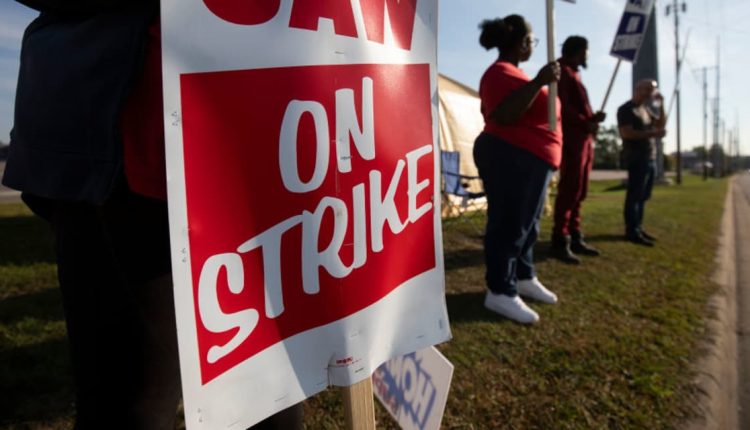The United Auto Workers strike against the Detroit-Three auto makers isn’t over, but the union has achieved a major breakthrough.
On Friday,
General Motors
(ticker: GM) agreed to put its electric vehicle battery plants into the master agreement that governs UAW workers at GM, according to union President Shawn Fain.
GM didn’t immediately respond to a request for comment.
The battery plant workers will now be, essentially, just like workers in engine and transmission plants. It was a sticking point for the auto makers. Capitulation very likely means the strike is nearing an end and also means the UAW is winning some major concessions.
“We were about to shut down GM’s largest moneymaker the Arilington, Texas [truck plant],” Fain said in a scheduled presentation to members that began at about 2 p.m. Eastern. “And just that threat has provided a transformation.”
In mid-September, Fain instructed union members to stop work at one plant operated by each of the Detroit Three and he has expanded the action in later weeks.
GM said it had made another counteroffer ahead of Fain’s talk on Friday to head off an escalation of the walkouts.
That is one win for GM. There was no escalation in strike activity. Plants for Ford Motor (F) and Stellantis (STLA) also were spared from the escalation.
About 25,000 UAW employees at the auto makers are on strike out of about 145,000. About 4,400 additional workers have been laid off as other parts of the manufacturing system run out of things to do with some plants not producing.
Fain spoke earlier Friday at an Economic Policy Institute conference, and said the union has been “complacent for my entire 29 years,” and that it has been a major source of frustration for him.
“This strike is about righting the wrongs of the past and winning justice for all of our members,” added Fain. “Strikes and the threat of strikes by a unified membership are what delivers.”
GM declined to provide specifics of its sixth proposal but investors know some of what has been offered. The company is offering big immediate wage increases to offset inflation with hourly rates going up between 16% to 40% depending on wage classifications. They are also offering inflation protection: If annual contract wage increases lag behind inflation, workers will essentially get the inflation rate as an increase.
Fain said Friday total wage increases offered by GM are at about 20% on average over the life of the contract, a little behind the 23% that Ford has offered.
Ford has made seven offers to the union. Along with wage increases, Ford is also offering to end wage tiers that have been in effect for more than a decade. The tiers essentially limit the top wage rate newer employees can reach. They were set up in response to auto makers’ struggles during the 2008-2009 financial crisis, as well as competition from foreign auto makers with nonunion workforces in mainly southern U.S. states.
Stellantis
declined to say how many offers it has made. It is offering bigger increases upon ratification, with total wages over the life of the contract rising by more than 20% on average. The company is also offering inflation protection as well, as no wage tiers in its parts business.
“We continue to have good momentum at the bargaining table and have been working diligently with the UAW over the last week to build on that,” said Stellantis in an emailed statement. “We are making progress, but there are gaps that still need to be closed.”
The strike isn’t over. There are no tentative agreements with any of the three companies. But there is positive momentum.
GM stock was up 2.6% in Friday trading at $31.10 after slumping 2.4% on Thursday, closing at $30.31, the lowest since the $29.59 it recorded on Sept. 30, 2020, according to FactSet. The drop Thursday was catalyzed by news GM might have to recall as many as 20 million vehicles to replace an air bag part, sending shares lower.
Ford stock had risen 1.1%. Stellantis shares had gained 3.3%.
Coming into Friday trading, GM shares were off about 22% since the start of July, when a strike began looking likely, while the
S&P 500
was down about 3%. Ford shares were down 21%. Stellantis shares were up about 8%.
Stellantis is a more global company, less affected than the other two by the UAW strike. Stellantis stock is also cheaper, trading for less than four times estimated 2024 earnings. GM and Ford shares trade for less than five and seven times, respectively.
Write to Rupert Steiner at [email protected] and Al Root at [email protected]
Read the full article here

